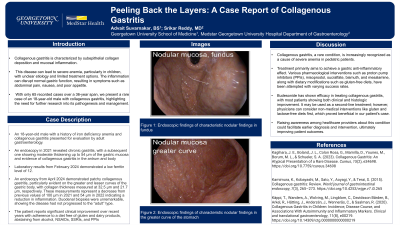Tuesday Poster Session
Category: Stomach
P5102 - Peeling Back the Layers: A Case Report of Collagenous Gastritis
Tuesday, October 29, 2024
10:30 AM - 4:00 PM ET
Location: Exhibit Hall E

Has Audio

Advait Suvarnakar, BS
MedStar Georgetown University Hospital
Washington, DC
Presenting Author(s)
Advait Suvarnakar, BS, Srikar Reddy, MD
MedStar Georgetown University Hospital, Washington, DC
Introduction: Collagenous gastritis is characterized by subepithelial collagen deposition and mucosal inflammation. This disease can lead to severe anemia, particularly in children, with unclear etiology and limited treatment options. With only 65 recorded cases over a 36-year span, we present a rare case of an 18-year-old male with collagenous gastritis.
Case Description/Methods: An 18-year-old male with a history of iron deficiency anemia and collagenous gastritis presented for evaluation by adult gastroenterology. An endoscopy in 2021 revealed chronic gastritis, with a subsequent one in July 2022 showing moderate thickening of the gastric mucosa and evidence of collagenous gastritis in the antrum and body, with collagen thickness measuring up to 54 µm. Laboratory results from February 2024 demonstrated normal CBC and CMP, but a low ferritin level of 12. An endoscopy from April 2024 demonstrated patchy collagenous gastritis, particularly evident on the greater and lesser curves of the gastric body, with collagen thickness measured at 32.5 µm and 21.7 µm, respectively. These measurements represent a decrease from previous values of 100 µm in 2021 and 54 µm in 2022 indicating a reduction in inflammation. Duodenal biopsies were unremarkable, showing the disease had not progressed to the “adult” type. The patient reports significant clinical improvement over recent years with adherence to a diet free of gluten and dairy products, abstaining from alcohol, NSAIDs, SSRIs, and PPIs. The patient’s chronic collagenous gastritis has shown progressive improvement, likely attributable to dietary modifications. Consequently, no additional medical intervention was recommended, with a follow up endoscopy 1 year later.
Discussion: Collagenous gastritis, a rare condition, is increasingly recognized as a cause of severe anemia in pediatric patients. Treatment primarily aims to achieve a gastric anti-inflammatory effect. Various pharmacological interventions such as proton pump inhibitors (PPIs), misoprostol, sucralfate, bismuth, mesalamine, along with dietary modifications such as gluten-free diets, have been attempted with varying success rates. Budesonide has shown efficacy in treating collagenous gastritis, with most patients showing both clinical and histologic improvement. It may be used as a second-line treatment however, physicians can consider non-medical interventions like gluten and lactose-free diets first, which proved beneficial in our patient's case.
Disclosures:
Advait Suvarnakar, BS, Srikar Reddy, MD. P5102 - Peeling Back the Layers: A Case Report of Collagenous Gastritis, ACG 2024 Annual Scientific Meeting Abstracts. Philadelphia, PA: American College of Gastroenterology.
MedStar Georgetown University Hospital, Washington, DC
Introduction: Collagenous gastritis is characterized by subepithelial collagen deposition and mucosal inflammation. This disease can lead to severe anemia, particularly in children, with unclear etiology and limited treatment options. With only 65 recorded cases over a 36-year span, we present a rare case of an 18-year-old male with collagenous gastritis.
Case Description/Methods: An 18-year-old male with a history of iron deficiency anemia and collagenous gastritis presented for evaluation by adult gastroenterology. An endoscopy in 2021 revealed chronic gastritis, with a subsequent one in July 2022 showing moderate thickening of the gastric mucosa and evidence of collagenous gastritis in the antrum and body, with collagen thickness measuring up to 54 µm. Laboratory results from February 2024 demonstrated normal CBC and CMP, but a low ferritin level of 12. An endoscopy from April 2024 demonstrated patchy collagenous gastritis, particularly evident on the greater and lesser curves of the gastric body, with collagen thickness measured at 32.5 µm and 21.7 µm, respectively. These measurements represent a decrease from previous values of 100 µm in 2021 and 54 µm in 2022 indicating a reduction in inflammation. Duodenal biopsies were unremarkable, showing the disease had not progressed to the “adult” type. The patient reports significant clinical improvement over recent years with adherence to a diet free of gluten and dairy products, abstaining from alcohol, NSAIDs, SSRIs, and PPIs. The patient’s chronic collagenous gastritis has shown progressive improvement, likely attributable to dietary modifications. Consequently, no additional medical intervention was recommended, with a follow up endoscopy 1 year later.
Discussion: Collagenous gastritis, a rare condition, is increasingly recognized as a cause of severe anemia in pediatric patients. Treatment primarily aims to achieve a gastric anti-inflammatory effect. Various pharmacological interventions such as proton pump inhibitors (PPIs), misoprostol, sucralfate, bismuth, mesalamine, along with dietary modifications such as gluten-free diets, have been attempted with varying success rates. Budesonide has shown efficacy in treating collagenous gastritis, with most patients showing both clinical and histologic improvement. It may be used as a second-line treatment however, physicians can consider non-medical interventions like gluten and lactose-free diets first, which proved beneficial in our patient's case.
Disclosures:
Advait Suvarnakar indicated no relevant financial relationships.
Srikar Reddy indicated no relevant financial relationships.
Advait Suvarnakar, BS, Srikar Reddy, MD. P5102 - Peeling Back the Layers: A Case Report of Collagenous Gastritis, ACG 2024 Annual Scientific Meeting Abstracts. Philadelphia, PA: American College of Gastroenterology.
